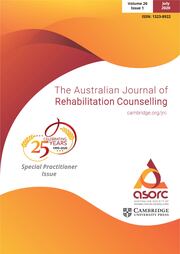No CrossRef data available.
Article contents
Changes in Society and Changes in Approaches to Disability: The Need for a New Paradigm
Published online by Cambridge University Press: 27 August 2015
Extract
Congratulations to all of you and ASORC on your 25th Anniversary. It is great to be able to be here with you at this historic time. I want to express my appreciation to organizers of this conference, ASORC and each of you here. I want to thank Trevor Hawkins for inviting me, and also to acknowledge Bert Biggs who gave me the opportunity to be involved with the Journal during the past few years.
I also want to thank you for the honor of being able to share a few thoughts with you about rehabilitation counseling. It is particularly pleasing to me to be here, in that this presentation is on the eve, as some of you may know, of my leaving Australia, having been here for three years. It has been a wonderful time both personally and professionally — an opportunity not many have to practice their profession in a different country and culture — albeit not one that was totally foreign in that you all use English.
I want to share a few thoughts today related to the rehabilitation and rehabilitation counseling profession and think a bit about what I see as happening as we stand on the brink of a new millennium. It is not new thinking nor particularly original, borrowing as I have from many sources, though I must take full responsibility for what I say. Also, I should emphasize that it is not offered as advice but rather a reinforcement of what many of you already know. As an educator and university professor, I do get stuck in one mode sometimes overemphasizing what I consider important. My remarks are based on my obviously American background but hopefully tempered with some of my experiences and observations here in Australia.
- Type
- Articles
- Information
- Copyright
- Copyright © Cambridge University Press 1999


